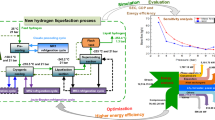Abstract
The present study aims to make a thermodynamic analysis of an ethylene cascade re-liquefaction system that consists of the following two subsystems: a liquefaction cycle using ethylene as the working fluid and a refrigeration cycle operating with a hydrocarbon refrigerant. The hydrocarbon refrigerants considered are propane (R290), butane (R600), isobutane (R600a), and propylene (R1270). A computer program written in FORTRAN is developed to compute parameters for characteristic points of the cycles and the system’s performance, which is determined and analyzed using numerical solutions for the refrigerant condensation temperature, temperature in tank, and temperature difference in the cascade condenser. Results show that R600a gives the best performance, followed by (in order) R600, R290, and R1270. Furthermore, it is found that an increase in tank temperature improves system performance but that an increase in refrigerant condensation temperature causes deterioration. In addition, it is found that running the system at a low temperature difference in the cascade condenser is advantageous.
Similar content being viewed by others
References
Anderson TN, Ehrhardt ME, Foglesong RE, Bolton T, Jones D, Richardson A, 2009. Shipboard reliquefaction for large LNG carriers. Proc. 1st Annual Gas Processing Symposium, Doha, Qatar.
Baek S, Hwang G, Lee C, Jeong S, Choi D, 2011. Novel design of LNG (liquefied natural gas) reliquefaction process. Energy Conversion Management, 52(8-9), 2807–2814. DOI: 10.1016/j.enconman.2011.02.015
Beladjine MB, Ouadha A, Adjlout L, 2013. Performance analysis of oxygen refrigerant in an LNG BOG re-liquefaction plant. Procedia Computer Science, 19, 762–769. DOI: 10.1016/j.procs.2013.06.100
Beladjine BM, Ouadha A, Benabdesslam Y, Adjlout L, 2011. Exergy analysis of an LNG BOG re-liquefaction plant. Proc. 23rd IIR Int. Congress Refrigeration, Prague, Czech Republic.
Berlinck EC, Parise JAR, Pitanga Marques R, 1997. Numerical simulation of an ethylene re-liquefaction plant. Int. J. Energy Research, 21(7), 597–614. DOI:10.1002/(SICI)1099-114X(19970610)21:7<597::AID-ER1 93>3.0.CO;2-5
Bosnjakovic F, 1965. Technical thermodynamics. Holt, Rinehart and Winston, New York.
Bounefour O, Ouadha A, 2014. Thermodynamic analysis and working fluid optimization of a combined ORC-VCC system using waste heat from a marine diesel engine. Proc. ASME 2014 Int. Mechanical Eng. Congress Exposition, Montreal, Canada.
Brodyansky VM, Sorin MV, Le Goff P, 1994. The efficiency of industrial processes: exergy analysis and optimization. Elsevier, New York.
Chien MH, Shih MY, 2011. An Innovative optimization design for a boil-off gas reliquefaction process of LEG vessels. J. Petroleum, 47(4), 65–74.
Chin YW, 2006. Cycle analysis on LNG boil-off gas re-liquefaction plant. J. Korean Institute Appl. Superconductivity Cryogenics, 8(4), 34–38.
Dimopoulos GG, Frangopoulos CA, 2008. A Dynamic model for liquefied natural gas evaporation during marine transportation. Int. J. Thermodynamics, 11(3), 123–131. http://dx.doi.org/10.5541/ijot.220
Djermouni M, Ouadha A, 2014. Thermodynamic analysis of an HCCI engine based system running on natural gas. Energy Conversion Management, 88(12), 723–731. DOI: 10.1016/j.enconman.2014.09.033
Gomez JR, Gomez MR, Bernal JL, Insua AB, 2015. Analysis and efficiency enhancement of a boil-off gas reliquefaction system with cascade cycle on board LNG carriers. Energy Conversion Management, 94(4), 261–274. DOI: 10.1016/j.enconman.2015.01.074
Kotas TJ, 1985. The exergy method of thermal plant analysis, 1st ed. Butterworth, London.
Li Y, Jin G, Zhong Z, 2012. Thermodynamic Analysis-based improvement for the boil-off gas reliquefaction. Process of Liquefied Ethylene Vessels, Chemical Eng. Technology, 35(10), 1759–1764.
Moon JW, Lee YP, Jin YW, Hong ES, Chang HM, 2007. Cryogenic refrigeration cycle for re-liquefaction of LNG boil-off gas. Int. Cryocooler Conference, Boulder, 629–635.
Moran MJ, Shapiro HN, 2000. Fundamentals of engineering thermodynamics, 4th ed. Wiley, New York.
Nanowski D, 2012. Gas plant of ethylene gas carrier and a two stages compression optimization of ethylene as a cargo based on thermodynamic analysis. J. Polish CIMAC, 7(1), 183–190.
Ouadha A, En-nacer M, Adjlout L, Imine O, 2005. Exergy analysis of two-stage refrigeration cycle using two natural substitutes of HCFC 22. Int. J. Exergy, 2(1), 14–30. http://dx.doi.org/10.1504/IJEX.2005.006430
Ouadha A, En-nacer M, Imine O, 2008. Thermodynamic modelling of a water-to-water heat pump using propane as refrigerant. Int. J. Exergy, 5(4), 451–469. http://dx.doi.org/10.1504/IJEX.2008.019115
Ouadha A, Haddad C, En-nacer M, Imine O, 2007. performance comparison of cascade and two-stage refrigeration cycles using natural refrigerants. Proc. 22nd Int. Congress Refrigeration, Beijing, China.
Pil CK, Rausand M, Vatn J, 2008. Reliability assessment of reliquefaction systems on LNG carriers. Reliability Eng. System Safety, 93(9), 1345–1353. DOI: 10.1016/j.ress.2006.11.005
Romero J, Orosa JA, Oliveira AC, 2012. Research on the Brayton cycle design conditions for reliquefaction cooling of LNG boil off. J. Marine Science Technology, 17(4), 532–541. DOI: 10.1007/s00773-012-0180-3
Sayyaadi H, Babaelahi M, 2010. Thermoeconomic optimization of a cryogenic refrigeration cycle for re-liquefaction of the LNG boil-off gas. Int. J. Refrig., 33(6), 1197–1207. DOI: 10.1016/j.ijrefrig.2010.03.008
Shin Y, Lee YP, 2009. Design of a boil-off natural gas reliquefaction control system for LNG carriers. Appl. Energy, 86(1), 37–44. DOI: 10.1016/j.apenergy.2008.03.019
Skovrup MJ, Jakobsen A, Rasmussen BD, Andersen SE, 2012). CoolPack (Version: 1.5). Available from: http://en.ipu.dk/Indhold/refrigeration-and-energy-technology/co olpack.aspx
Syechev VV, 1983. Les equations différentielles de la thermodynamique. Edition Mir, Moscou.
Author information
Authors and Affiliations
Corresponding author
Rights and permissions
About this article
Cite this article
Beladjine, B.M., Ouadha, A. & Addad, Y. Thermodynamic analysis of hydrocarbon refrigerants-based ethylene BOG re-liquefaction system. J. Marine. Sci. Appl. 15, 321–330 (2016). https://doi.org/10.1007/s11804-016-1371-9
Received:
Accepted:
Published:
Issue Date:
DOI: https://doi.org/10.1007/s11804-016-1371-9




